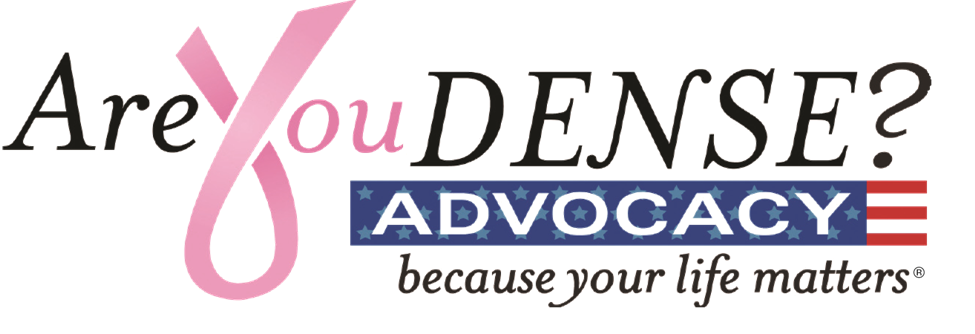Contact: Andrea Cohen Andrea Cohen Public Relations Andrea@ACohenPR.net
FOR IMMEDIATE RELEASE: December 8, 2014 at 5 p.m. PDF version here
Are You Dense Advocacy, Inc. Urges Caution Re Latest Annals of Internal Medicine Study; Authors Aim To Keep Women From Learning About Dense Breast Tissue Cancer Risk
WOODBURY, Conn., December 8 – The non-profit patient advocacy organization, Are You Dense Advocacy, Inc. and its physician allies strongly refute a study published in this week’s Annals of Internal Medicine. The study, Benefits, Harms, and Cost-Effectiveness of Supplemental Ultrasonography Screening for Women with Dense Breasts, presents findings counter to the massive amount of data supporting a woman’s right to know if she has dense breast tissue after having a mammogram. (1) Dense breast tissue is the strongest predictor of mammography screening missing cancer.
The study authors, who used computer generated lifetime calculations in lieu of real practice, conclude that laws requiring supplemental ultrasound screening for women with dense breasts would substantially increase costs and save few lives.
“Nothing could be further from the truth,” states Nancy M. Cappello, Ph.D., Founder of Are You Dense Inc. and Are You Dense Advocacy Inc., and inspiration of the first density reporting law in 2009 in the state of Connecticut. “Computer projections using past fixed data to project the future is problematic. The future of technology changes so rapidly that this analysis lacks relevance to the now and beyond.”
“And contrary to what the authors claim, of the 19 states that require women be notified in their mammography reporting results if they have dense breast tissue, none mandate or require that they have follow up screening, such as ultrasound. The mandates do promote, however, informed discussions on screening between patient and provider. ”
For more than two decades, scientific studies demonstrate that forty percent of women have dense breast tissue. Dense breast tissue is the strongest predictor of the failure of mammography to detect cancer, missing 50% of cancers in dense breasts. (1)
Regina Hooley, MD, Associate Professor, Department of Diagnostic Radiology Yale University School of Medicine and Jean Weigert MD, Assistant Clinical Professor of Radiology, University of Connecticut, concur with Dr. Cappello.
Dr. Weigert adds, "The authors of the Annals of Internal Medicine study ignore current data, such as the four years of data on Connecticut women and adjunct ultrasound that I recently presented at a major radiology meeting (2). My research shows that we significantly reduced false positives from the first to the fourth year. We now find the smallest invasive cancers that have not spread to the lymph nodes as a result of screening beyond mammography in women with dense breast tissue."
Dr. Hooley furthers this with,"Breast density notification is a good thing. All women should be made aware of the limitations of mammography and option of supplemental screening. Breast ultrasound is a good screening test because it is very safe, widely available and relatively inexpensive. Eventually, further research and newer technologies will determine the best supplemental screening protocol."
Dr. Cappello points to the American Medical Association (AMA) Code of Medical Ethics, as a key reason that physicians should inform women about their breast density after mammography. According to AMA, withholding medical information from patients without their knowledge of consent is ethically unacceptable. Informed consent produces better doctor patient communication and is not based on economic parameters or resource availability.
As a result of the compelling body of research on the masking and causal risk of dense breast tissue and the withholding of breast tissue density by the medical community for decades, legislators across the country, fueled by women harmed by their dense tissue, have championed density reporting laws, giving consumers information about the potential limitations of mammography to detect cancer while promoting conversations about personalized screening surveillance with health-care providers.
“Breast density notification is independent of the Annals of Internal Medicine study results,” concludes Dr. Cappello. “To align the two is preposterous, and moreover, potentially dangerous to women’s health and their right to know medical screening test results.”
# # #
(1) Journal of the American College of Radiology Decade of "Normal" Mammography Reports -- The Happygram, Dr. Nancy Cappello, December 2013
http://www.jacr.org/article/S1546-1440%2813%2900575-9/abstract
(2) The Connecticut Experiment Continues: Ultrasound in the Screening of Women with Dense Breasts Years 3 and 4 Dr. Jean Weigert, data presented at Radiological Society of North America, November 30, 2014 http://rsna2014.rsna.org/program/details/?emID=14004644



